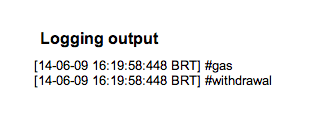BkperApp provides a simple and secure way to access the Bkper REST API through Google Apps Script infrastructure.
With BkperApp you can build Apps and Bots to your Books to create bookkeeping and accounting solutions on Google Workspace, such as the Bkper Add-on for Google Sheets, simple automations or advanced solutions, and you can manage your scripts in the Dashboard.
It works the same way your favorite Google Apps Script library works, like CalendarApp, DocumentApp, SpreadsheetApp and the like.
See the complete reference
This library is already published as an Apps Script, making it easy to include in your project. To add it to your script, do the following in the Apps Script code editor:
- Click on the menu item "Resources > Libraries..."
- In the "Add a Library" text box, enter the Script ID "1hMJszJGSUVZDB3vmsWrUZfRhY1UWbhS0SQ6Lzl06gm1zhBF3ioTM7mpJ" and click the "Select" button.
- Choose a version in the dropdown box (usually best to pick the latest version).
- Click the "Save" button.
To use TypeScript in the development of an Apps Script project, see the Develop Apps Script using TypeScript as reference.
npm i -S @bkper/bkper-app-types
or
yarn add --dev @bkper/bkper-app-types
{
"compilerOptions": {
"typeRoots" : ["node_modules/@bkper", "node_modules/@types" ]
}
}
Learn more about @types, typeRoots and types
The get a Book, use the parameter found on the URL accessed on bkper.com:
To get the Book name:
function getBookName() {
var book = BkperApp.getBook("agtzfmJrcGVyLWhyZHIOCxIGTGVkZ2VyGNKJAgw");
var bookName = book.getName();
}To record a simple transaction:
function recordATransaction() {
var book = BkperApp.getBook("agtzfmJrcGVyLWhyZHIOCxIGTGVkZ2VyGNKJAgw");
book.record("#gas 63.23");
}You can also record transactions in batch by passing an Array of strings as the record method parameter:
function batchRecordTransactions() {
var book = BkperApp.getBook("agtzfmJrcGVyLWhyZHIOCxIGTGVkZ2VyGNKJAgw");
var transactions = new Array();
transactions.push("#breakfast 15.40");
transactions.push("#lunch 27.45");
transactions.push("#dinner 35.86");
book.record(transactions);
}The above code will send all records in a bulk. Very useful for importing large amount of data without the risk of reaching script limits.
Each book is a large database and every interaction is done in terms of queries. Everytime you "select" an Account by clicking on left menu at bkper.com, you are actually filtering transactions by that Account.
When you retrieve transactions, the getTransactions method returns an TransactionIterator to let you handle potentially large datasets:
function listTransactions() {
var book = BkperApp.getBook("agtzfmJrcGVyLWhyZHITCxIGTGVkZ2VyGICAgKCtg6MLDA");
//GetTransactions returns an interator to deal with potencial large datasets
var transactionIterator = book.getTransactions("account:'Bank' after:01/04/2014");
while (transactionIterator.hasNext()) {
var transaction = transactionIterator.next();
Logger.log(transaction.getDescription());
}
}Run the queryTransactions function, exchanging your bookId, with the same query, check the log output and you will see the same descriptions:
You can access all Account objects, in a way similar to the left sidebar:
function listAccounts() {
//Open the book
var book = BkperApp.getBook("agtzfmJrcGVyLWhyZHIOCxIGTGVkZ2VyGNKJAgw");
var accounts = book.getAccounts();
for (var i=0; i < accounts.length; i++) {
var account = accounts[i];
if (account.isPermanent() && account.isActive()) {
Logger.log(account.getName() + ": " + account.getBalance());
}
}
}


